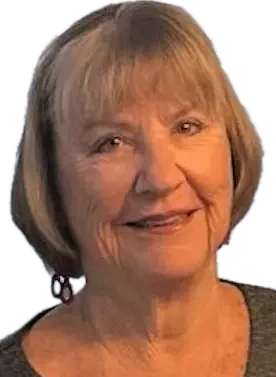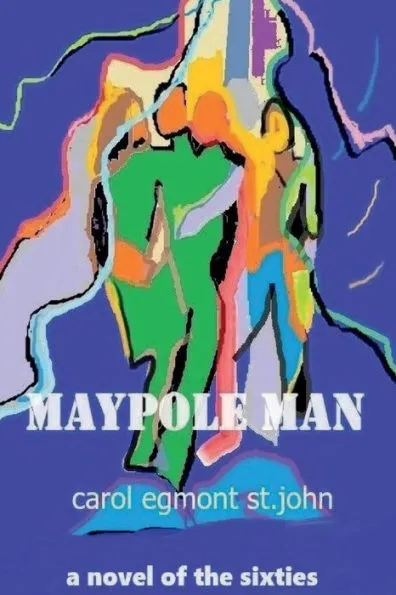Maypole Man: A Novel of the Sixties by Carol Egmont St. John
America’s 1960s were revolutionary years marked by anti-war protests, flag-burning, civil disobedience and assassinations. Many young people lost their dreams and ideals in the maelstrom, some emerged enlightened, but all were affected by the turbulence.
Authors who chose to write about the era have a head start if they lived through it. Carol Egmont St. John did, and her new book, Maypole Man: A Novel of the Sixties, begins in Brooklyn where St. John was born and raised, then shifts to Vermont where, like many of her generation, she explored a new lifestyle.
The maypole of the title harks back to pagan times, when Europeans celebrated the beginning of summer around May 1 by erecting a tall wooden pole to dance and sing around. It was a day of feasting, drinking and relaxed morals, the ancient equivalent of sex, drugs and rock and roll.
Broken Souls Find Each Other
The maypole man of the title is Peter Rozynski, the son of Polish-born parents. In 1968, Peter is on the stage of the New York Metropolitan Opera Company auditioning for the opportunity of his lifetime. A singing prodigy, he’d discovered his love of opera when he was eight years old, long before his agent insisted he change his name to Peter Russian to match his tall, dark looks. His mother believed in him; his mentor believed in him; his agent believed in him, but Peter, haunted by past panics and missteps, flubs his big chance.
Disheartened and seeking to disappear forever, he wanders Manhattan and finds himself in a downtown bar. Drowning his sorrows in alcohol, he’s rescued by the bar’s piano player, Carla Luna, who also has reasons to hide.
Carla’s beautiful face is heavily scarred, the result of a deadly car crash the night of her triumphant reign as high school homecoming queen. Unable to bear the pity of her family and friends, she changed her name, left her small town and melted into New York’s anonymous streets.
Two broken souls have found each other.
Unique, Compelling Characters
Where do young lovers go to create their own world, forget their pasts, grow organic gardens and make babies? In Vermont, Peter and Carla, now pregnant, find jobs at a busy country inn operated by other refugees from society, Cam and Milly. The four read Buckminster Fuller, Rachel Carson and the Bhagavad-Gita, discuss the state of the world and its discontents, and follow their hearts and sexual inclinations.
Attractions between characters are formed and fulfilled. Peter is devoted to Carla and their baby daughter, but succumbs to dalliances with other women. One of the enticements of this book is to keep reading to find out who ends up with whom.
St. John creates sympathetic, interesting personalities. Milly is a “spunky, lively, heady woman” with strong anti-war feelings and suspicions of the government’s authority. Both Carla and Cam are artisans — she creates dolls, he carves hobby horses. Following the trajectories of their business ventures is another enjoyable story arc.
Peter’s mother, Sasha, was born in Poland and came to the United States to marry Tomczyk, a man she’d never met. He is a tailor and she is a seamstress, but more than making a business together, they find real love. Tragically, Tomczyk is killed fighting WWII for America in Europe, and Sasha becomes a self-employed single mother.
Wide-Ranging Historical Tale
Lyrics from songs of the sixties mark the beginning of each chapter and foreshadow events and emotions to unfold. Carla’s reckoning with her past is heralded by Pete Seeger:
“To everything
Turn, turn, turn
There is a season
Turn turn turn
And a purpose under heaven…”
St. John weaves her characters through the warp and woof of history to tell her wide-ranging and compelling tale. The author of three previous novels, she’s also a poet, artist, columnist and a workshop facilitator dedicated to empowering women in their creative endeavors. Her recent solo retrospective of artwork, “Emerging Woman” focused on the “inner dialogue of being a woman” and an “affirmation of womanhood.” Her latest novel may be titled for a man, but it’s the women of the book that call the tunes.
About Carol Egmont St. John:
 A poet, teacher, speaker, artist and columnist, Carol St. John never ceases to employ her creative spirit. She believes the arts are the sacred thread that weaves, informs and lifts humanity and thus describes herself as a cheerleader for self-expression.
A poet, teacher, speaker, artist and columnist, Carol St. John never ceases to employ her creative spirit. She believes the arts are the sacred thread that weaves, informs and lifts humanity and thus describes herself as a cheerleader for self-expression.
In the middle of her life, St. John went to graduate school at Northeastern University to get an MA in Writing and since then has written six books. The first is Taproots: Where Ideas are Born, a compilation of art, poetry, and homilies. The second, Anchors of the Soul, is a novel placed in Gloucester, MA, about a friendship between two women from different generations and social strata. The third, Little Ways, is a tale of an artist, innocence and love dying, and moving beyond the myths of romance and motherhood. The fourth, Such a Nice Girl, is a foray into innocence and wisdom, and the issues of choice. The fifth is called All is Art – Art is All. This book is designed for teachers and students demonstrating the relevance of art to life through activities and illustrations.
Maypole Man takes you to Brooklyn where St. John was born and raised, and to Vermont where she explored a new lifestyle during the revolutionary times of the late 1960’s. It is a novel but is true to the era.




